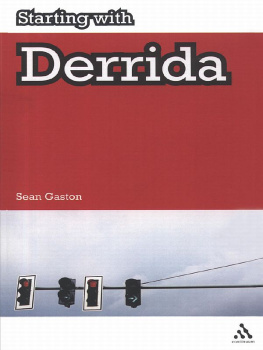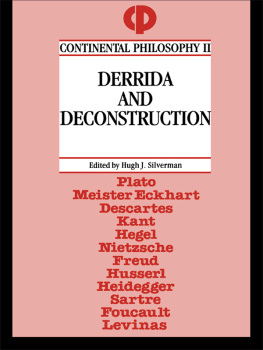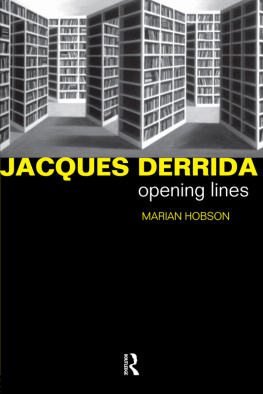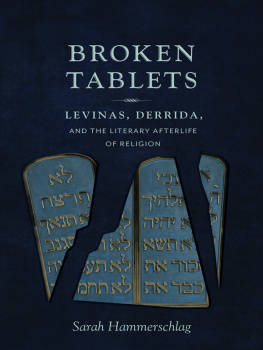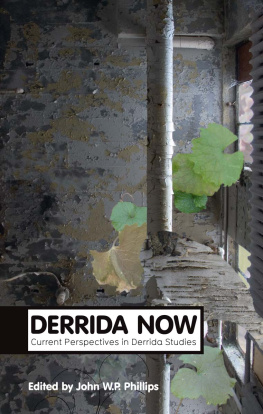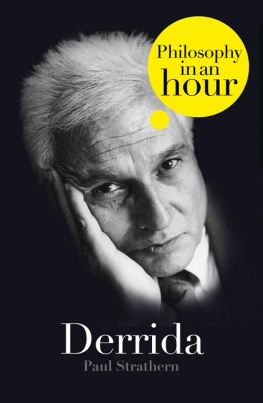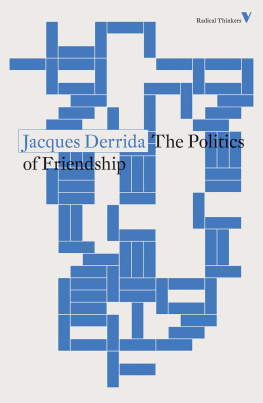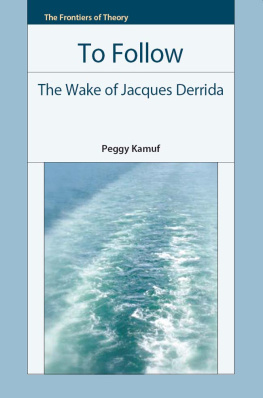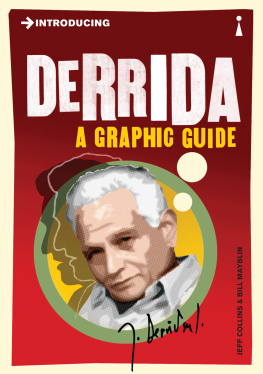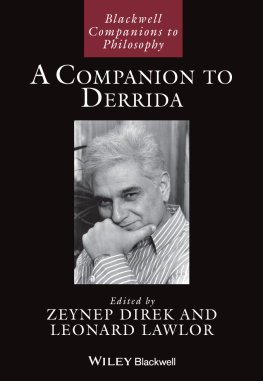STARTING WITH DERRIDA
Also available from Continuum:
Derrida and Disinterest, Sean Gaston
Impossible Mourning of Jacques Derrida, Sean Gaston
Jacques Derrida: Live Theory, James K. A. Smith
Derrida: A Guide for the Perplexed, Julian Wolfreys
STARTING WITH DERRIDA:
PLATO, ARISTOTLE AND HEGEL
SEAN GASTON

Continuum International Publishing Group
The Tower Building | 80 Maiden Lane |
11 York Road | Suite 704 |
London SE1 7NX | New York, NY 10038 |
www.continuumbooks.com
Sean Gaston 2007
All rights reserved. No part of this publication may be reproduced or transmitted in any form or by any means, electronic or mechanical, including photocopying, recording, or any information storage or retrieval system, without prior permission in writing from the publishers.
British Library Cataloguing-in-Publication Data
A catalogue record for this book is available from the British Library.
ISBN: | HB: 0-8264-9785-3
9780826497857 PB: 0-8264-9786-1
9780826497864 |
Library of Congress Cataloging-in-Publication Data
A catalog record for this book is available from the Library of Congress.
CONTENTS
PROLOGUE:
PALINTROPES
On 2 October 1994 Jacques Derrida participated in a discussion to mark the opening of a new doctoral programme in the philosophy department at the University of Villanova. On two occasions Derrida tells his audience that the next day his latest work, Politics of Friendship, will be published in Paris: it is the day before the politics of friendship. Derrida goes on to say that his new work is mainly a book on Plato and Aristotle and adds, I think we need to read them again and again and I feel that, however old I am, I am on the threshold of reading Plato and Aristotle. I love them and I feel I have to start again and again and again. It is a task which is in front of me, before me. One cannot, and must not, be beguiled by the possibility of a pure recommencement, by a return that would signify a new departure... or some degree zero. It is always too late to start again. The gesture of starting again is itself already part of the tradition of metaphysics: metaphysics always starts again and always with itself, with Plato and Aristotle.
One of the ways that Derrida responded to the dilemma that to challenge or resist Western metaphysics one must somehow start again and recognize that it is always too late to start again was through the movement of what he calls a palintrope. It startles itself and, as Derrida says, loses the logos. Rather than moving backwards and forwards through the same word, or over the same ground, it suggests a turning backwards that happens more than once, a turning backwards that already repeats, splits, doubles and exceeds itself.
This book is divided into two parts. The first part, Histories of Literature, explores Derridas palintropic rereading of Plato and Aristotle through the question of the possibility of a history of literature. At the beginning of Of Grammatology (196567), Derrida had written of the importance of a reading that gets away, at least in its axis, from the classical categories of history: from the history of ideas, of course, and from the history of literature, but perhaps above all from the history of philosophy. But for this very reason, he was preoccupied with philosophys difficult relationship with literature and history, and with the relationship between history and literature. One can see this in his summary of a seminar from the early 1980s on Kant and Kafka:
I was concerned with the as if (als ob) in the second formulation of the categorical imperative: Act as if the maxim of your action were by your will to turn into a universal law of nature. This as if enables us to reconcile practical reason with an historical teleology and with the possibility of unlimited progress. I tried to show how it almost introduces narrativity and fiction into the very core of legal thought, at the moment when the latter begins to speak and to question the moral subject. Though the authority of the law seems to exclude all historicity and empirical narrativity, and this at the moment when its rationality seems alien to all fiction and imagination even the transcendental imagination it still seems a priori to shelter these parasites.
It is from his early readings on exceeding or resisting the ontological inheritance in Plato, and his redefinition of the concept of history (which I explore through that remarkable quasi pre-Socratic, Herodotus), that Derrida begins to sketch out the problem of a relation between history and literature that is not simply mediated or predetermined by philosophy. In his reading of Plato in The Double Session (1969), Derrida uses the phrase the history of literature. It is by taking the graphics of this line (or hyphen or dash) between history and literature seriously that one can follow his later retranslations of Heidegger in the 1970s to get a sense of the trait (the line, the trace) that is always en retrait, with-drawing or retreating from itself as itself, which Derrida places and dis-places in the ceaseless negotiation between history and literature.
The first part of the book ends with a possible history of literature, by reading the entrance of TIME in Act Four of The Winters Tale in relation to Britains tortuous 170-year time lag (15821752) in changing from the Julian to the Gregorian calendar, which began in Shakespeares lifetime. It is through Derridas important differences with Heidegger over how to read Aristotle on the relation between time and space that one can get a sense of Shakespeares own strange turning back, once more, to Aristotle.
The second part of the book, Histories of the Senses, is concerned with Derridas palintropic rereading of Aristotle and Hegel. In his long engagement with Aristotles treatise On the Soul Derrida gestures to a new history of the senses. It is through that great reader of Aristotle, Hegel, that Derrida reads the irreducible gaps (carts) of and as contact, and the reverberating blows from the outside (les coups du dehors) that challenge the history of the senses as no-more-than-five, as always five-in-one. As he suggests in On Touching Jean-Luc Nancy (19922000), there are blows and caresses, always somewhere in between, that exceed the Aristotelian inheritance of the diaphanous as the unseen origin of seeing, as a hearing that only hears itself, and the not x but the possibility of x at the heart of the legacy of Husserlian phenomenology.
It is from tracing the reliance of Husserlian phenomenology on Aristotle that Derrida turns back, once more, to Hegel. He begins Glas (1974), his remarkable reworking of the problem of a history of philosophy (on Hegel) in relation to the possibility of a history of literature (on Genet), with an unpublished seminar in 1967 devoted to the first chapter of Hegels Phenomenology of Spirit on sensible certainty (sinnliche Gewiheit). Hegel opens the Phenomenology by defining sensible certainty as a simple, pure and undeveloped being. In his Lectures on the History of Philosophy
Next page
